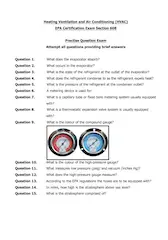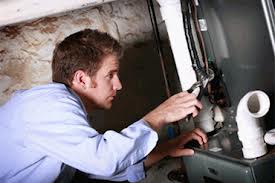Congratulations on your decision to embark on a career in the HVAC industry! You’ve made a right move as the employment of heating, air conditioning, and refrigeration mechanics and installers is expected to grow 34 percent from 2010 to 2025, much faster than the average for all occupations! This field is increasingly in high demand, so there are many job opportunities! The job outlook for HVAC professionals is excellent as this specialized field is projected to grow faster through 2021, than other occupations that require post-secondary education or an associate degree (According to The U.S. Bureau of Labor Statistics). As you start your journey, we highly recommend that you acquire the appropriate HVAC certifications, licenses, and training. We are happy to help students prepare for their 608 certifications online exam to get their HVAC license. More information is provided in our practice test area.
158 HVAC 608 Practise Exam Questions
158 HVAC 608 Practise Exam Questions
We will get you ready for your EPA Certification!

EPA Regulations
EPA regulations under Section 608 of the Clean Air Act require that technicians who maintain, service, repair, or dispose of equipment that could release refrigerants into the atmosphere must be certified.
Technicians are required to pass an EPA-approved test to earn Section 608 Technician Certification. The tests are specific to the type of equipment the technician seeks to work on and the test must be administered by an EPA-approved certifying organization. It’s good to know that Section 608 Technician Certification credentials do not expire. The core test must be taken as a proctored exam in order to attain Universal Certification in the USA. Read our article about preparing for the 608 Exam. There are also some HVAC certification requirements that vary from state to state.
State requirements
HVAC certification requirements vary from state to state. However, most employers prefer to hire an HVAC technician who has completed formal training, which may include an apprenticeship or classroom instruction. We will help you understand the HVAC certification and NATE (North American Technician Excellence) HVAC certification process.
Please select your state below to read more about the specific requirements for your state so you can quickly get started.
List of states
HVAC certification can be obtained after an individual completes certain training requirements in an accredited program. HVAC stands for heating, ventilation, and air conditioning, and this industry offers a large variety of specialties that have different training and education requirements. The popular careers in the field of air conditioning, refrigeration, heating, and cooling, will involve the maintenance and installation of commercial cooling and heating systems, new product design, and system engineers.
There are a number of skills that are required for commercial and residential installation, repair, and maintenance of HVAC certification units. Some of these HVAC technicians also referred to as techs, will receive training through associate’s degree or certificate programs or a related field, such as electronics. A program for installation training can be completed in a little as six months, or as long as two years, while the system designer education can be completed in two to four years.
There are currently two certificate options available for online HVAC training. An individual can complete a certificate program to become an Installer and repair tech, or they can complete a certificate program that focuses on HVAC system design. Both of these online HVAC training programs are designed to provide flexibility in the student’s schedule.
Online Courses
We’ve compiled a list of the 6 best HVAC courses, training, classes & tutorials online with HVAC certification. These are the most reputable sources that will help get your foot in the door as an HVAC engineer or technician. You can take these courses at your own pace and from anywhere with internet access. So if you’re ready to start learning about heating, ventilation, air conditioning (HVAC) then let’s go!
If you want to become a certified professional in the field of heating, ventilation & air conditioning (HVAC), then we have just what you need right here. Here’s our list of the 6 best HVAC courses, training, classes & tutorials online so that anyone who wants to work in this industry can do so safely and efficiently.
Check out our new article 6 Best Hvac Courses, Training, Classes & Tutorials Online
Certificate Program for HVAC Installers
This HVAC certification program will require the completion of one to sixteen classes or three hundred credit hours. A student will learn about different types of heat transfer methods, system components, and safety considerations. Many of these programs will lead to licensing opportunities and will prepare a student for an entry-level position as an installer.
For the individual that’s seeking an entry-level position, continuing education credits or wants to strengthen their knowledge of this field, this type of program will offer training in troubleshooting and installations of HVAC systems. A student will be eligible to take the certification exam once this program has been completed.
Courses for these programs can be separated into sections, or there can be several different classes. These courses will instruct the student on everything from repair and troubleshooting techniques to basic system information.
The fundamentals of the HVAC class will introduce a student to the industry and discusses the measurements for gas and air works. The second half of this class will focus primarily on safety. A student will learn the correct way to use personal safety equipment and how to use compressed air and fire extinguishers.
The HVAC electrical course will teach students about the characteristics of AC and DC circuits. This class teaches students how to use and read schematic symbols for electrical circuits. The last half of the course will feature the discussion of the application of alternation currents for different types of systems.
The HVAC refrigerant class will cover the components of refrigeration systems, including condenser units and compressors.
HVAC System Design Certificate Program
These system design programs will include instruction on the comparison of systems, code requirements, and digital controls. Online programs can be found through a community college or trade school engineering department or their professional studies department. A student will learn about how to evaluate various systems for maintenance requirements, repair, and system retooling.
This certificate program will consist of five to six classes. The student will need to have a bachelor’s degree and engineering experience in order to be eligible for enrollment. A student will learn about the laws regarding the installation and design of HVAC systems, the controls used in these systems, and system calculations.
The design class consists of four different classes. The beginning class will introduce students to the components of HVAC systems and system classifications. The advanced classes will cover system comparisons, system costs, and HVAC equipment repair and maintenance.
The Intro to direct digital controls class will teach a student how these controls work and how they can affect the design process of different systems. This class will detail the steps in the design and prepare a student for the advanced DDC course.
The design calculations class will teach students how to correctly calculate the cooling and heating loads, in addition to other required calculations for a number of buildings. A student will also explore guidelines and codes that will affect these calculations. Students will also get an overview of HVAC design and computer programs utilized in the field.
There are a number of certifying organizations that offer credentials for this career field, for many categories, including energy modeling and building. Applicants will need to pay a fee and provide transcripts in order to meet the certification criteria.
HVAC System Designers
Many techs will begin their employment working as an apprentice, which lasts for two to four years. This apprenticeship can include both classroom learning and hands-on training.
HVAC Tech
For design, development, and research of new systems, an employer will typically prefer to hire people that have at least a bachelor’s degree in electrical or mechanical engineering. Some positions can even require the tech to have a master’s degree, although most employers will at times hire a non-degree development and research team member.
Degree Programs for HVAC Techs and System Designers
System designers and techs in this field can choose from certificate programs and associates or three to five-year bachelor’s degree programs.
The one-year certificate program will teach a student the basics of repair and maintenance for both residential and commercial systems. A student will learn about cooling and heating science, system installation, and blueprint reading. This program will prepare the graduate for an entry-level position.
Some of the core topics in this program will include heating systems, applied physics, technical math, motor controls, and refrigeration theory.
The two-year associate’s degree program for this field will teach students problem-solving techniques, in addition to the proper methods of technician-customer interaction. The hands-on training in this program will help a student to obtain practical experience with electronic and mechanical controls and system repair. To qualify for program enrollment, the potential student will need to have a background in sciences and algebra.
This degree program will distinguish itself from the certificate program by also featuring general education classes. Some of the core classes will include topics on heating systems, steam systems, electrical servicing, heat pumps, and technical writing.
The four-year bachelor’s degree program will teach small business management, in addition to system design, energy management, and control theory. A student can earn hands-on experience through senior projects and internships. This program will cover system calculations, retrofitting, and maintenance basics. Other core courses will include electronics, automation design, duct design, energy analysis, load calculation, trigonometry, and algebra.
HVAC Installers
HVAC certification requirements for the installer will vary from state to state, but will usually involve on-the-job training and post-secondary education. The majority of mechanics and installers will begin training at technical schools or community colleges. These programs will typically culminate in a certificate or diploma. The training program you choose will need to be accredited through a certifying organization, such as the EPA. In addition to a training program, a certified HVAC installer will usually be required to complete a two to four yearlong apprenticeship, before being eligible for certification.
HVAC Tech Salary
This occupation will require the tech to be skilled in air conditioning, sheet metal work, plumbing, and electrical work. A student will study digital electronics, sheet metal fabrication, blueprint reading, and refrigeration. Some programs will teach students how to solder and weld. A program will also delve into corrective repair and maintenance for air conditioning systems and furnaces.
Installers will receive training in the handling of refrigerant units and the standards of storage and transportation. Programs that deal with refrigeration techniques might also be referred to as HVACR programs.
More information on specialised HVAC University Programs
Please read our posts on Master Specialist Certification and further professional level certification in order to join professional organizations in the field, including the Refrigeration Service Engineers Society HVAC certification here

